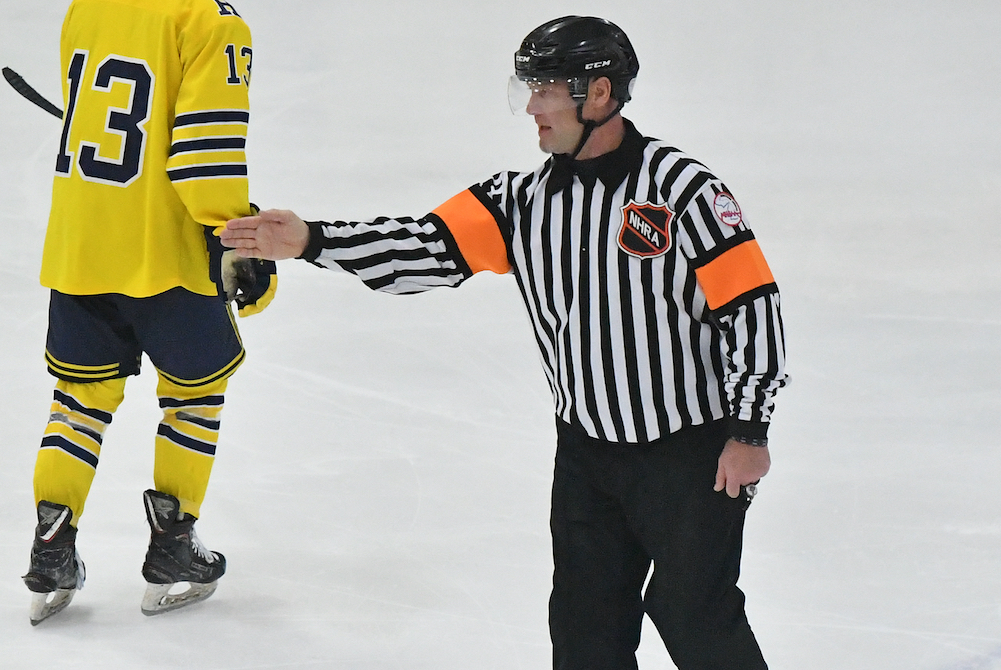
Retired NHL-er Back on Ice to Answer Call - By Making Them
By
Rob Kaminski
MHSAA benchmarks editor
March 16, 2023
The most accomplished skater on the ice during Friday’s triple-overtime MHSAA Division 1 Semifinal hockey thriller between Hartland and Brighton was not wearing the school colors of either team.
In front of a packed house at Plymouth’s USA Hockey Arena, referee Bryan Smolinski was in stripes, just like the rest of his officiating crew.
In his former life, he pulled on plenty of sweaters before lacing up the skates. That happens when one logs more than 1,000 games, tallies nearly 300 goals (274) and close to 400 assists (377) with eight teams spanning a 15-year playing career in the National Hockey League.
So, how did the 52-year-old former star player find himself on the ice last weekend as one of the referees for the pinnacle weekend of this high school season? Good question, even for the man known as “Smoke” during his playing days.
“I was working in youth development programs a few years back and reached out to some Michigan guys I had connections with about other ways to help the game,” Smolinski said. “I called Kevin May just to chat and asked, ‘Hey, how’s your reffing going?’ He said, ‘You know, we’re down a little bit,’ then said, ‘Why don’t you do it?’ I said, ‘Not a chance,’” Smolinski laughed.
Never Say Never
May persisted, imploring his friend to skate with him during a Fall league at Cranbrook in Bloomfield Hills. After eight weeks, once a week, Smolinski had a revelation.
“I’m like, ‘I’m kind of diggin’ this,’” Smolinski said “So, I did all the testing, and the educational part of it, and I really enjoyed it. I got with Danny (DiCristofaro) and his group, and he put me in as much as he could, and I really started to get my feet wet.”
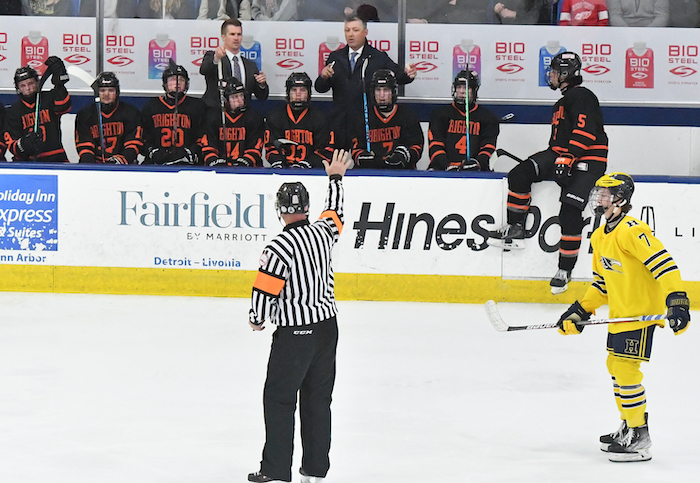 DiCristofaro is the assigner and referee-in-chief for the MHSAA’s Northeast Hockey Referees Association, and he has seen Smolinski’s growth first-hand.
DiCristofaro is the assigner and referee-in-chief for the MHSAA’s Northeast Hockey Referees Association, and he has seen Smolinski’s growth first-hand.
“Obviously he’s got great instincts and a feel for the game, along with a wealth of experience, all of which has allowed him to climb the ladder quickly,” said DiCristofaro. “It’s been a joy to watch his growth as an official.”
Fast forward to last Friday, and there were Smolinski and May sharing duties as referees during the MHSAA Semifinal with linesmen Michael Andrews and Thomas Robbins.
In between, there has been a learning curve that still continues, but the jump to officiating was not quite as daunting as his introduction to the NHL.
“I was scared to death. My first game was against Mario Lemieux. I’m in the old Boston Garden and now I’m playing against these guys and it’s their job, and they’re out there trying to make a living,” Smolinski recalled.
The emotions were not running nearly as frenzied for his first game as an MHSAA official, obviously, yet respect came in a different form.
“I couldn’t pick the puck up, I was breathing heavily; it was Kevin and me doing a two-man game in Brighton,” Smolinski recalled. “There were a few high-end kids playing, and I’m thinking, ‘I’m dying here.’ You know, there’s no training for that first time.”
What that experience did, however, was revitalize Smolinski in a new way. His playing career is well documented, not only in the NHL, but around Michigan. He enjoyed an honor-laden career at Michigan State University from 1989-93 before joining the Boston Bruins (who had drafted him three years earlier) at the end of the ’93 NHL campaign. Even after his final season, with Montreal in 2007-08, he stayed in the game via men’s leagues, or coaching his son, Max.
Smolinski and his wife, Julie, have three daughters: Ashtyn (22), Jojo (16) and Rylen (12), along with Max, whom dad coached for seven years including during a national championship run with a Little Caesars U15 team in 2019. Max, 19, is now playing collegiately at Rensselaer Polytechnic Institute.
So, for Smolinski, officiating offers a new chapter.
“Reffing brought back ... I wouldn’t say love of the game, because that’s always been there; it’s a different side of enjoying the game now. I have no horse in the race, my son’s off to college, my daughters are doing their thing; I wanted to find something new in the game,” Smolinski said. “I’ve coached, and I don’t want to do that. I found this, and I’ve stuck with it.”
Old College Ties
One of the great benefits of athletics at any level are the friendships made. For two kids who met in their first years on the MSU campus and forged a bond that lasts to this day, it’s amazing how their careers reached the pinnacle and have now come full circle.
Wes McCauley, an MSU teammate, is one of Smolinski’s best friends. After numerous years in the minor leagues, McCauley, like his friend, made it to the NHL. But McCauley made it as an official, working his first NHL game in 2003, when Smolinski was nearing the end of his playing career.
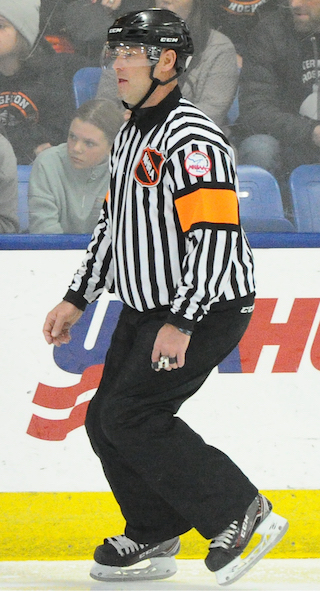 Their games lined up on just a few occasions in the NHL, and the two lobbied hard to have McCauley work Smolinski’s 1,000th career game in his final season with the Canadiens in 2007-08. The request, sadly, was denied by the league.
Their games lined up on just a few occasions in the NHL, and the two lobbied hard to have McCauley work Smolinski’s 1,000th career game in his final season with the Canadiens in 2007-08. The request, sadly, was denied by the league.
On the rare occasions when the friends did share the same ice, less than a handful by Smolinski’s count, it was McCauley who was forced to rebuff any attempts at fraternization. It’s just part of an official’s edict.
“For both of us, it was amazing; it was just great,” Smolinski said. “I’d say, ‘Hey man what’s up?’ and he says, ‘Can’t talk.’ I’m like, ‘What do you mean, we talk all the time.’ Again, he’s like, ‘Can’t talk, get away from me.’ You know, it was just business.”
McCauley then reached the 1,000-game plateau himself in 2018 and is still going strong as a regular selection for playoff duties with nine Stanley Cup Finals assignments, including last year.
So, it should have been natural for Smolinski to go to his old friend immediately for officiating pointers once he joined the ranks, right? Well, maybe not immediately.
“I talk to Wes all the time, but I actually hid it from him right out of the gate because I didn’t want to take his razzing. Eventually it got out, and he was loving it. He started sending me whistles and visors and pants,” Smolinski said, grinning. “And none of it fit, you know, because I’m older and fatter, and he’s so damn skinny. So, I still had to go out and get all new gear.”
Both Sides Now
Having been to the top of his profession, now moving to the other side of that same mountain that his friend McCauley scaled, the respect has grown for those blowing the whistle.
“The preparation for officiating is much more mental,” Smolinski said. “Way more rules oriented. You’re always trying to get away with things that you can as a player; now you have to police that.”
Smolinski has a distinct advantage.
“I know everything they’re trying to do because I’ve done it. I know where you’re going with the puck, I know what kind of breakout you’re trying to do,” Smolinski said. “I have all the instincts, now I just try to stay out of the way and not ruin their game. The most fun is watching the game develop and the ups and downs. For me to be out there and enjoy it with them, that’s the fun part.”
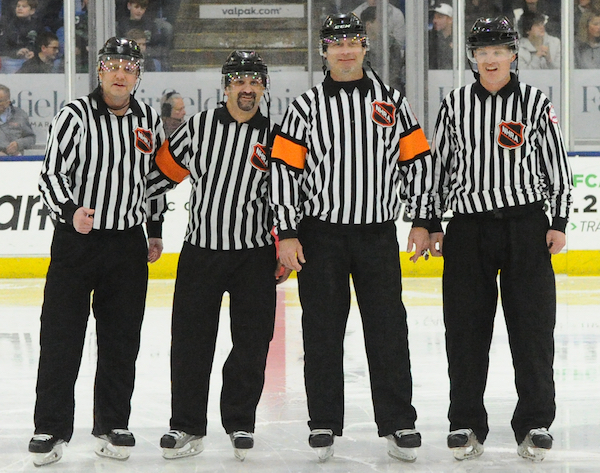 Those who have played hockey at any level have a built-in advantage should they consider the officiating avocation: the ability to skate. Unlike officiating in any other sport, skating is a prerequisite. This makes the pool limited, and almost solely composed of former players. Smolinski offers this advice.
Those who have played hockey at any level have a built-in advantage should they consider the officiating avocation: the ability to skate. Unlike officiating in any other sport, skating is a prerequisite. This makes the pool limited, and almost solely composed of former players. Smolinski offers this advice.
“I prefer sticking with high school because I think there’s more decorum, more administrative structure. Kids are playing for their schools, there’s loyalty there,” said Smolinski. “And there is more accountability. People need report to athletic directors and supervisors. Other levels can be more loosely governed, or a bit more maverick in nature. Moms and dads get involved more, coaches maybe know a little less,” said Smolinski.
He has, in fact, worked a handful of non-school games, and there’s a stark difference.
“I wanted to see what was going on, and I see it first-hand,” Smolinski said. “There are some crazy people and parents out there, and these guys are getting absolutely tortured. I’ve been tortured. There has to be a level of respect for what officials do. I think schools can rein that in a little more. All the guys I’ve met give up a lot of time and work hard because they love to do it and love the game.”
All sports need an assist from school administration and from those who once played the games to keep the officials recruitment moving in the right direction. People like Smolinski can help.
“He clearly doesn’t need to do this, and that’s what makes it so fantastic,” DiCristofaro said. “We need more people who have played – at any level – to do what he’s done and stay in the game as officials.”
Smolinski continues to promote the game in other ways as well. Currently, he is involved in the NHL’s Learn To Play initiative, which aims to inspire youth and welcome more families into the hockey community.
“We work hand-in-hand with the NHL Players Association for player development and industry growth,” Smolinski said. “Ages 5 to 9 are introduced to hockey, get head-to-toe gear and instruction, and meet some former players.”
The idea is to have fun first, which can translate into years and maybe even a lifetime in the sport. It’s a lifetime that has given Smolinski so much and continues to do so as he watches it unfold for others from his new vantage point.
PHOTOS (Top) MHSAA official Bryan Smolinski signals during Friday's Division 1 Semifinal between Brighton and Hartland. (2) Smolinski, a retired NHL standout, communicates with the Bulldogs' bench. (3) Smolinski keeps watch during game play. (4) Smolinski, third from left, with his crew: Michael Andrews, Kevin May and Thomas Robbins.
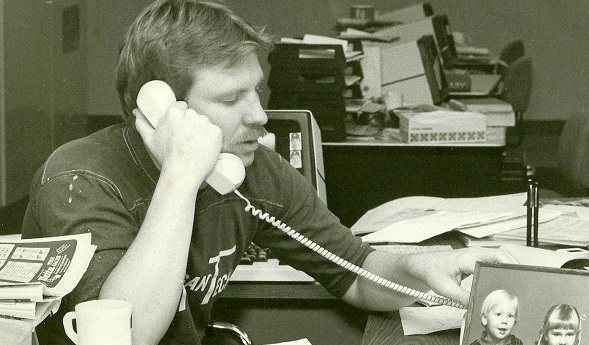
Whymer Made Blue Water Moments into Memories
By
Paul Costanzo
Special for MHSAA.com
September 29, 2020
 When considering all the reasons Jim Whymer was a beloved and Hall of Fame sportswriter in the Thumb area, one stands out above the rest – he cared.
When considering all the reasons Jim Whymer was a beloved and Hall of Fame sportswriter in the Thumb area, one stands out above the rest – he cared.
He cared about the quality of the sports section at the Times Herald in Port Huron. He cared about making sure the impossible task of covering schools and sports as equally as possible was accomplished. And he cared about what the newspaper meant to the community.
But most of all, he cared about the people he was writing about.
“He wasn’t going in it just to get a story – he cared about people,” said Shawn Sharrow, a 1994 Marine City graduate who coached basketball at Marine City and St. Clair. “He cared about relationships. As much as he liked sports, he liked people and building those relationships over the years. After he did an interview with you, he would stand there and talk with you for another half hour. He just wanted to develop those friendships.”
Whymer, who worked at the Times Herald from 1978 through 2012, died this past Thursday of metastatic melanoma. He was 64.
He is survived by his wife, Patty, his children Traci Whymer (Tyson Connolly), Kyle (Amanda) Whymer and Joel (Rachel) Whymer, and his grandson, Finn; and by his mother Teresa, sister Michele Seif and brother Bill (Pattie).
He also is survived by the countless yellowing press clippings with his byline that can be found in hundreds of scrapbooks throughout homes in the Blue Water Area. Clippings that no doubt made special memories that much more special for those holding onto them.
 “I think like no other person I’ve been around, he made kids feel special,” Port Huron Northern boys basketball coach Brian Jamison said. “He had an amazing ability to make kids feel special. It was in his articles and how long he would take to talk to a kid. He would know the kid’s uncle and their cousin, and he would talk to them about that. I think kids genuinely felt better after talking to him.”
“I think like no other person I’ve been around, he made kids feel special,” Port Huron Northern boys basketball coach Brian Jamison said. “He had an amazing ability to make kids feel special. It was in his articles and how long he would take to talk to a kid. He would know the kid’s uncle and their cousin, and he would talk to them about that. I think kids genuinely felt better after talking to him.”
Whymer won several awards for his journalism, including a spot in the Basketball Coaches Association of Michigan Hall of Honor and the Port Huron Sports Hall of Fame.
Good luck finding those awards displayed anywhere, though. Whymer was more interested in making sure the athletes and coaches were getting proper recognition.
“He was really thorough and really interested in what we were doing, even in little old Deckerville when he had Port Huron and Port Huron Northern in his backyard,” Deckerville football coach Bill Brown said. “He’d come up to Deckerville, he’d even go to playoff games – we'd play across the state and he was there. Then after the game, he would just ask you respectful questions. It’s just too bad, because he’s definitely going to be missed. Everybody looked forward to seeing him. He was more than welcome here; he probably could have stayed overnight at someone’s house if he needed to.”
Brown, Jamison and Sharrow had interactions with Whymer as players and coaches. Brown also got to see Whymer as an official, as Whymer worked for more than three decades officiating basketball, baseball, softball and football games throughout the area.
“You can’t even get mad at the guy because he’s such a good guy,” Brown said with a laugh. “He was always square with you.”
Jamison also coached both of Whymer’s sons, and currently has Kyle as his junior varsity basketball coach at Northern. All of the Whymer children played sports at Northern, with Traci being part of an MHSAA title-winning tennis team and Joel setting records on the basketball court and earning a scholarship at Lake Superior State University. (He would later transfer to Grand Valley State.)
 “Jim’s always been more like family to me,” Jamison said. “I think everyone feels that way about him. He’s like your fun uncle that you love to talk to. Jim always did a nice job of keeping the story separate from him being the dad. In that respect, he made it easy on me. He was very, very supportive of his children. That’s something – as special as other people felt – that guy was truly all in for all three of his kids when it came to sports and school. I think he was an ultra-professional, and he didn’t want to overwrite about his kids.”
“Jim’s always been more like family to me,” Jamison said. “I think everyone feels that way about him. He’s like your fun uncle that you love to talk to. Jim always did a nice job of keeping the story separate from him being the dad. In that respect, he made it easy on me. He was very, very supportive of his children. That’s something – as special as other people felt – that guy was truly all in for all three of his kids when it came to sports and school. I think he was an ultra-professional, and he didn’t want to overwrite about his kids.”
After leaving the Times Herald, Whymer began working in the athletic department at St. Clair County Community College, where he continued his quest to make things as special as possible for student athletes. His main duties included scheduling high school and middle school events at the college’s Fieldhouse – whether it be smaller local tournaments or a multi-day holiday basketball showcase that grew to more than 40 teams.
The Fieldhouse can fit more than 2,000 spectators, and Sharrow said if not for restrictions because of COVID-19, a memorial service for Whymer could fill it. That’s likely not an exaggeration.
“He might be showing up at your practice in the last 10 or 15 minutes, and he always walked in the gym with a smile on his face,” Sharrow said. “If he was ever having a bad day, you’d never know it. He made athletes feel important. Even watching him as a coach talking to my players, you could see their faces light up that they were going to be in the paper and that Jim Whymer wanted to talk to them.”
 Paul Costanzo served as a sportswriter at The Port Huron Times Herald from 2006-15, including three years as lead sportswriter, and prior to that as sports editor at the Hillsdale Daily News from 2005-06. He can be reached at [email protected] with story ideas for Genesee, Lapeer, St. Clair, Sanilac, Huron, Tuscola, Saginaw, Bay, Arenac, Midland and Gladwin counties.
Paul Costanzo served as a sportswriter at The Port Huron Times Herald from 2006-15, including three years as lead sportswriter, and prior to that as sports editor at the Hillsdale Daily News from 2005-06. He can be reached at [email protected] with story ideas for Genesee, Lapeer, St. Clair, Sanilac, Huron, Tuscola, Saginaw, Bay, Arenac, Midland and Gladwin counties.
PHOTOS: (Top) Longtime sportswriter Jim Whymer works the phones during his time at the Port Huron Times Herald. (Middle) Whymer also was an MHSAA-registered official for 35 years. (Below) Whymer is survived by his wife Patty and their three children. (Photos courtesy of the Whymer family.)

